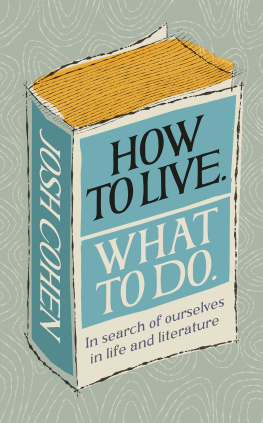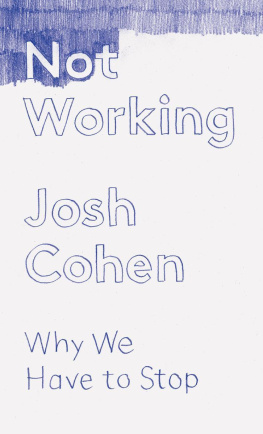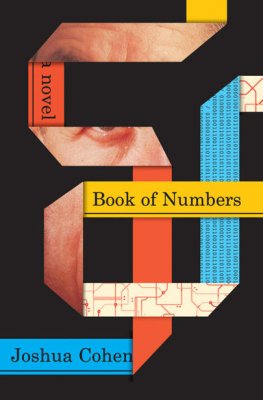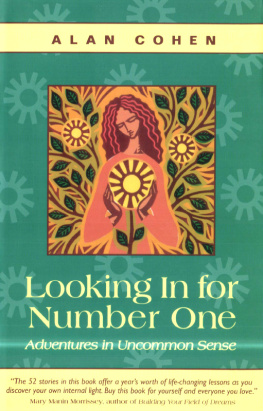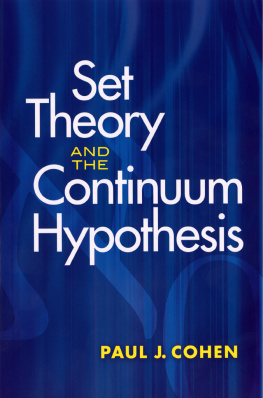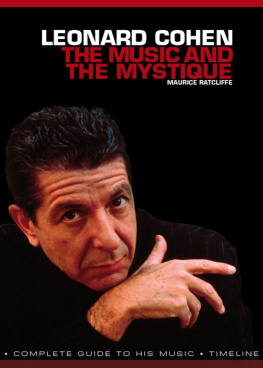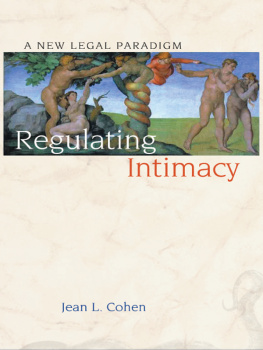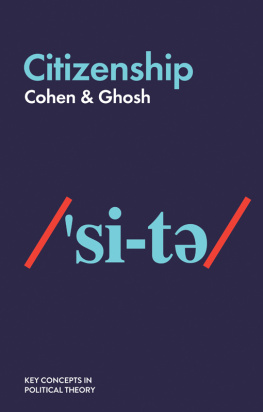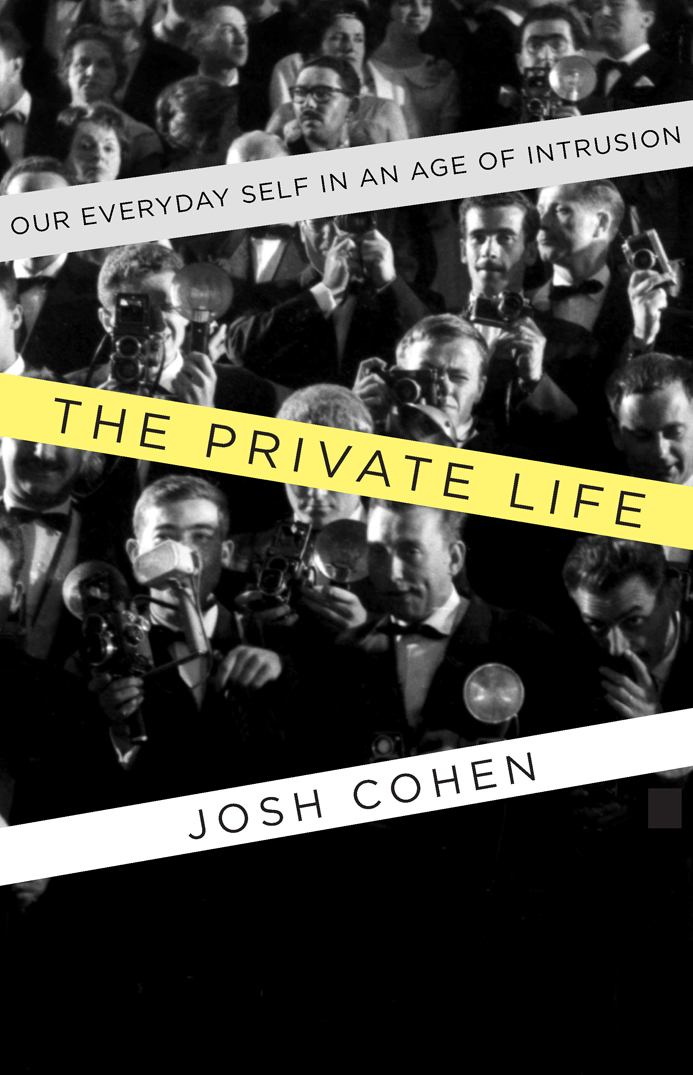Table of Contents
Guide
THE PRIVATE LIFE

Copyright 2015 Josh Cohen
All rights reserved under International and Pan-American Copyright Conventions. No part of this book may be used or reproduced in any manner whatsoever without written permission from the publisher, except in the case of brief quotations embodied in critical articles and reviews.
Library of Congress Cataloging-in-Publication Data Is Available
COUNTERPOINT
2560 Ninth Street, Suite 318
Berkeley, CA 94710
www.counterpointpress.com
Distributed by Publishers Group West
10 9 8 7 6 5 4 3 2 1
e-book ISBN 978-1-61902-637-7
To my family
Contents
Im in the sparsely populated carriage of an Overground train. As we crawl into Euston, the realization that Im the sole audience to a woman a few seats in front, tearfully berating a man on her mobile phone, tears me out of my reverie. Its over, she tells him through heaving sobs. Dont you fucking talk to me. I fucking hate you. Why? Dont you fucking give me why, you stinking bastard. Dont pretend you dont know. Dont pretend, dont, dont you fucking pretend. All her murderous despair throbs in her thumb as she terminates the call. She leans her head against the window, still volubly crying. I gaze out the opposite side, heat creeping up my face. I tell myself Im an involuntary witness to anothers lack of emotional inhibition, conveniently passing over my own rapt interest in the scene.
Several minutes later Im hovering in front of the magazine racks in Smiths. I stare glassily at the covers of Heat, Closer, Reveal, the titles amplifying the promise of furtive proximity intimated in the hazy shots below. An arrow tagged Serious tummy! points to the slack flesh spilling over the bikini bottom of a soap actress hunched on the edge of a sun lounger. Another, aimed at the ribcage pressing through the skin of a bikini-clad TV presenter, asks Dangerously skinny?! Something about the distracted obliviousness of their postures and expressions seems more obscene than anything the dead-eyed glamour models nearby can conjure. Too self-conscious to browse, I shuffle out, taking with me only my mild shame.
These unexceptional few moments have revealed to me my participation, at once resentful and willing, in a culture of intrusion, held together by the unholy alliance of voyeurism and exhibitionism. The first principle of this culture, upheld by wire taps and telephoto lenses on the one hand and by the pervasive casual display of personal intimacies on the other, is that I should know everything. Nothing, from the near side to the furthest reaches of bodily and emotional experience, should be kept from view. As those few minutes showed me, its hard to opt out of this culture and the malevolent excitement it stirs up.
Many celebrities and other public figures rightly protest against this culture, but their lamentations for their lost privacy only feed the spectacle they want to escape. Nothing seems better calculated to provoke an assault on privacy than the plea to respect it.
What accounts for this relentless war on our own and others privacy? What, exactly, are we attacking? No doubt our envy is never far away, our wish to despoil the beauty, wealth, fame, talent and love another enjoys more than us by ensuring theyll never really enjoy it. And so we lurch blindly between the idealization of airbrushed glamour and the humiliation of candid telephoto shots, caught in a vindictive rage to exhaust every possible form of the celebritys visibility. And why? What is this compulsive gorging on images of the same body and clothes and lovers and excesses?
Its as though were caught in the furious suspicion, amplified with every image, that were missing something, that the very thing were looking for is being withheld, that there are places beyond us no telephoto lens or bugging device can reach. The guiding principle of our culture might be formulated not so much as I should know everything as nothing should remain unknown to me. Its not, in other words, a question of wanting to know so much as a fear of what might remain unknown, inaccessible, in the dark.
The conception of privacy implicit in public debates around the competing rights of individual and public interest is a rather impoverished one, mired in the confusion of privacy with secrecy. Privacy is framed in terms of the secrets I may wish to unearth and you may wish to withhold your sexual or financial affairs, for example. This idea of private life can be reduced to what you might call bourgeois privacy, the privacy of what you do or own. When politicians, lawyers and journalists argue about privacy their focus is typically on those facts of external life you might prefer to keep to yourself. We can keep secret, writes the philosopher Martin Heidegger, only what we know. But isnt there another, more essential privacy, namely what I keep private even from myself and in spite of myself? Drag every sordid secret into the light and something of your self, perhaps the very thing that really matters, would still remain in the dark. Its the privacy of this stubborn remainder, which no lens can penetrate and no law can defend, that I shall explore in this book.
Books provided my first intuitions of this obscurity in the self. My avid consumption of poetry, novels and comics, unabated since early childhood, began in my fascination for the strangeness of other peoples voices. I read books obsessively, and eventually chose to teach them, because they hinted at the miraculous possibility of experiencing inner lives other than my own. Weeks into my undergraduate degree I read Freud, and immediately felt a deep and visceral affinity for his description of psychic life. But I was never much drawn to psychoanalytic literary criticism, to shedding the light of the unconscious, transferences or drives on the dark enigmas of poems and novels. My relationship to psychoanalysis felt somehow too private for that kind of generalized application. Freuds Dora, the first case history I read, showed me that psychoanalysis, for all its theoretical richness, was rooted not in speculative abstractions, but in a risky and unpredictable encounter between two live human beings.
I didnt know what to do with this conviction that psycho-analysis didnt live in texts alone, until I met a practising psychoanalyst many years later. Here was someone whose daily life, at once like and radically unlike mine, orbited around the experience of other voices and the struggle to listen to what they were saying. Within a few weeks of meeting him Id embarked on my own analysis and eventually on the long and difficult journey to becoming an analyst. Psychoanalytic training was at once a radical departure from and a continuation of the same personal project, a new way of tuning in to other voices not least other voices in myself.
The first premise of psychoanalysis is that the very existence of a private zone of inner life what psychoanalysis calls the unconscious is so unbearable that we spend much of our lives and energies denying it. I came across this insight in books; but it was only the long experience of being on and behind the couch that enabled me to feel rather than merely know it as true.


